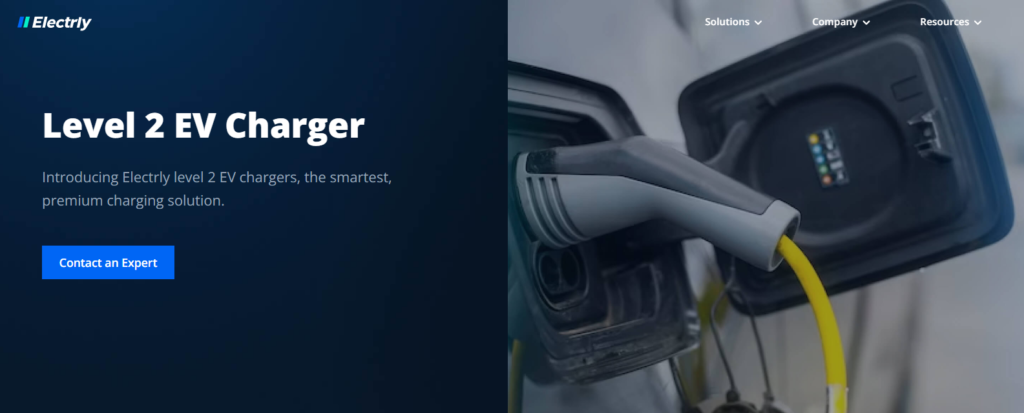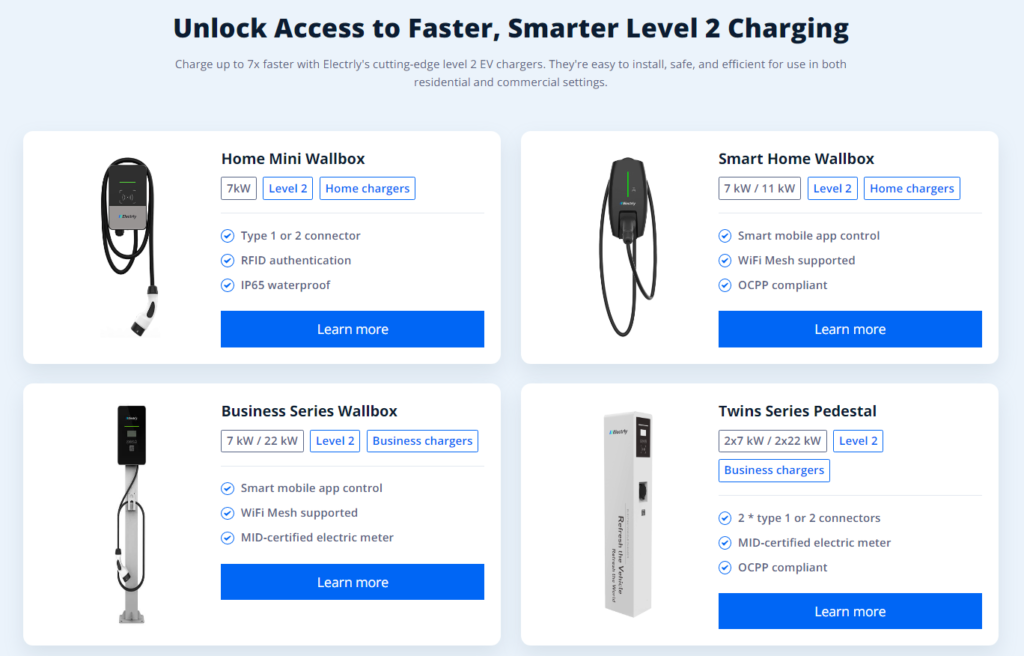Electric vehicles (EVs) are clean since they run on electricity, not gasoline or diesel. However, charging an electric car is a different experience, not as simple or quick as using a gas pump. There are different grades of gasoline, like regular, plus, or premium, but electric vehicle chargers are classified by levels rather than grades.
You must buy, install, and use a suitable EV charger for a smoother process. The levels describe how fast a charger will recharge an EVs battery. The higher the level of charging, the faster the charging process. For instance, a Level 2 charger is much faster than a Level 1 charger.

Even so, the charging speed is impacted by various variables, such as the type of EV you own, the battery capacity, or the power source output. Luckily, the home and workplace have become the main locations for charging, so EV owners can charge at a Level 2 station overnight or while working.
Level 2 EV charger is currently the most common EV charger installed, even with Level 1 chargers being the cheapest option. You can find Level 1 charger from Electrly.

Here’s your guide to a Level 2 electric car charging station and approximately how fast it can work.
Level 2 Charging Explained
Level 2 charging is the standard for most EV owners and can be installed at home, workplace, or public locations like train stations and shopping centers. The charging outlets are usually on a 50 amp circuit delivering 6 to 20 kW. That allows safe charging and ensures the car charges faster, between 3-8 hours from empty to full.
By utilizing a 208-240V dedicated circuit, a Level 2 charger provides 12 to 80 miles per hour, depending on the charger power output and the vehicle’s battery size. Many public charging stations utilize Level 2 chargers. Furthermore, Level 2 chargers use the industry standard SAE J1772 or J-Plug for North America.
A Level 2 charging station is the perfect solution for home charging. You can fully charge your car overnight, saving you money and time since electricity charges are cheaper overnight. Level 2 chargers are fast and easy to use and only require infrastructure already found in most places.
How Do I Get A Level 2 Charger Installed?
The best and cheapest solution would be to contact a certified electrician and tell them you want a 240V charger installed for your electric vehicle. It must be installed in a dedicated circuit capable of delivering 125% of the charger’s power. For example, a 32-amp charger must be installed on a 40-amp circuit.
The best spot to install a charger is usually inside a garage while considering how you park your car. Installation costs depend on how far your garage is from your house’s main electrical service. Also, the location of an electric vehicle charging port varies by model, so make sure to place the outlet in a place you would easily park normally.
For someone without a garage, pick the best outdoor spot to have your charger installed. Ensure the wires are wired safely, and the cord is long enough to reach your car. Otherwise, it’s essential to research to ensure you get a certified charging unit from a reputable brand such as Electrly.
How To Choose the Right EV Charger
In a household, you may need more than one charging station for your daily charging needs. Otherwise, if you wish to install a new charging outlet, consider the following several factors to find the perfect match.
- Cost
Before installing an EV charger, make sure you can afford it. Typically, Level 2 chargers cost between $250 and $1000 depending on the power and features available, with a similar installation fee ranging from $200 to $1000.
- Portability
EV chargers are typically classified into plug-in or hardwired options. Plug-ins offer the flexibility of quickly removing the charger to use in another location. Hardwired chargers are affixed to the wall and require an expert to disconnect them.
- Cable Length
EV charging cables are as short as 12 feet and as long as 25 feet. Hence, choose a charger with a cable long enough to reach the charge port of your car in any way you park it. A 20 feet long cable is usually recommended.
- Innovation
You can choose between smart or regular EV chargers. Smart chargers are equipped with apps, and their tech allows the owner to perform things like review charging sessions or schedule charging. Regular or dumb EV chargers are only used to charge.
- Power Output
The proper charger should have a power delivery of at least 32 to 40 amps. Such a charger is future-proof for your garage since some recent cars might not accept such much power, but most likely, your future electric car will.
- Safety Guaranteed
With a wide array of EV charging equipment on the internet, be wary of counterfeit products. The charging equipment you decide to use should be safety-certified with UL standards and have an extended warranty of up to 3 years.
Using Your EV Charger
Proper handling of an EV charger ensures it remains in good working condition for many years of service. Electrly recommends not charging the vehicle 100% daily to prolong the battery lifespan. Only charge it 100% if you need the extra range for an occasional long trip.
After a full charge, there’s no need to unplug the connector attached to the EV since it won’t hurt it. EV cars are designed in a way they stop charging and cut off any power once they reach their desired charging level. Below are some best practices to ensure your EV charger serves you well.
- Coil the cable when not in use to avoid it being run over.
- Unplug the unit during heavy rains or lightning storms.
- Never leave the connector lying on the floor.
- For plug-ins, the plug should be entirely secured into the outlet.
- Holster the connector when idle to prevent damage by dirt and moisture.

Factors That Impact Electric Car Charging Time
Charging factors can vary due to your power source or how much charge your car can handle. Below are various detailed factors that impact a car’s charging time.
- Car’s Battery Size
Unlike Level 1, Level 2 outlets charge your vehicle much faster. However, if your car offers more battery capacity, usually measured in kWh, you’ll need more time to charge your battery fully.
- Area Weather
Lower temperatures can affect your vehicle’s efficiency and prolong the charging times. On the other hand, hot weather can disrupt your car’s thermal management systems and efficiency at large. So, be sure to check the weather fluctuations in your location.
- Battery Charge Level
Is your battery empty or full? Topping up your battery when partially charged saves you significant charging time. Similarly, pushing current into a battery with below 20% or above 80% charge takes more energy and time.
- Charge Station Power Rate
Your charging time also depends on the maximum charging rate of the charging station you are currently using. So, even if your car can charge at a higher rate, it can’t surpass the charge station’s maximum power rate, which affects the charging time.
- Vehicle’s Charging Rate
Before charging, ask yourself how much charge your vehicle can accept at once. Sadly, your vehicle charging rate is fixed, and you can’t save time by plugging it into a more powerful charging station.
Conclusion
In the end, finding the correct charger depends on the capabilities of your EV and how much you want to drive in it. But after some experience, charging an EV becomes second nature. If you wish to quickly and easily install your home EV charger quickly and easily, visit our site, Electrly, for the best EV charging products and recommendations.
FAQs
1. Can I Install A Level 2 Charger In My Home?
Most houses in the US allow one to add a circuit for a Level 2 charger without upgrading the service. A Level 2 charger needs a dedicated 240-volt circuit similar to an electric clothes dryer. Though not mostly recommended, you can even share the existing circuit that powers the electric clothes dryer with your Level 2 EV charger if it’s in your garage or nearby.
2. How Does The Cost Of Charging Compare To Gasoline?
According to research, electric car drivers could save as much as $14,500 on fuel costs over 15 years by driving an EV instead of an internal combustion engine(ICE) vehicle. The cost to charge an EV depends on your charging location, your EV’s efficiency and use, region, and time.
The national average for electric vehicle charging is about $0.15/kWh. However, the cost per mile for gasoline vehicles ranges between $0.13 to $0.22 per gallon, with gas prices at $3 to $4. Remember, gas prices fluctuate constantly, and this estimate could be at the low end.
3. How To Charge An Electric Car At Home?
Charging at home is simple and a great way to enjoy EV ownership further and alleviate stress. Using a home electric vehicle charging station is safer, more convenient, and cheaper than plugging it into a public charger.
The possibility of experiencing range anxiety is low. Also, you’ll want to charge when demand is low to take advantage of off-peak demand pricing. You will likely find overnight charging is your best option.











